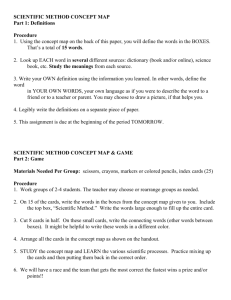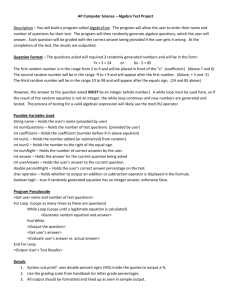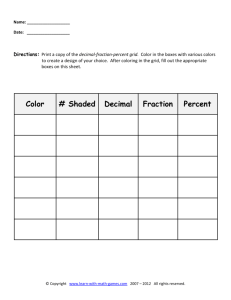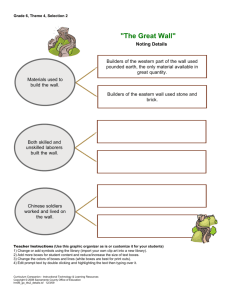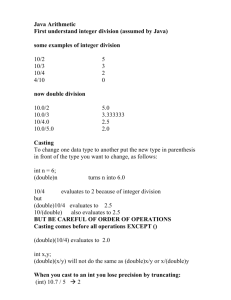Comp 311 Principles of Programming Languages Lecture 18 Implementations of Assignment and Mutation
advertisement
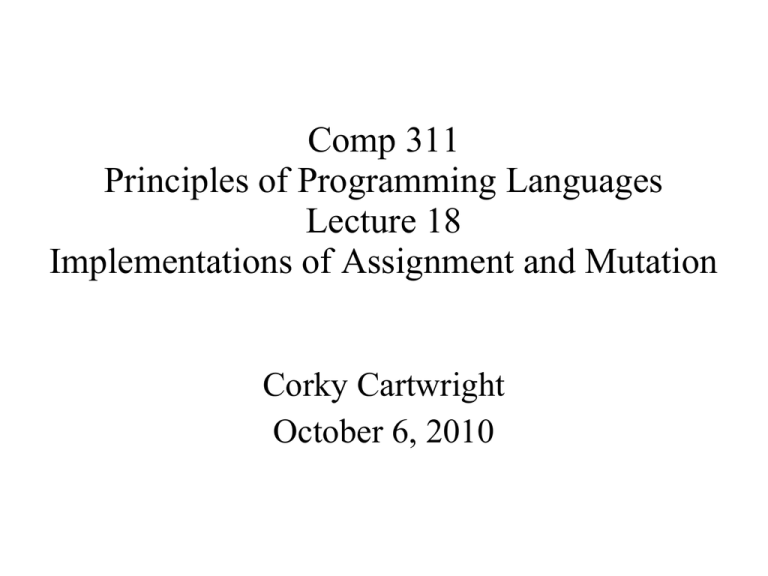
Comp 311
Principles of Programming Languages
Lecture 18
Implementations of Assignment and Mutation
Corky Cartwright
October 6, 2010
Parameter Passing Examples
Recall:
procedure Sum(int x, int y, int n) {
// actual x must occur free in actual y
int sum = 0;
for (x = 0; x < n, x++) sum = sum + y;
return sum;
}
int j, sum = 0;
int[10] a;
for (int i = 0; i < 10; i++) a[i] = i; //
initialize a
sum = Sum(j, a[j], 10));
// compute the sum
print(j, sum)
// print the
result
Parameter-Passing Scenarios
•
call-by-value: in Sum, the local variables x, y, n are new boxes with contents 0, 0, 10. Hence, the loop repeatedly
adds 0 to sum which is initially 0. Hence, the returned result is 0 and the program prints
0 0
•
call-by-name: in Sum, the local variables x, y, n are bound to suspensions with bodies j, a[j], temp closed over
the calling environment where temp is a variable generated by the compiler/interpreter holding the value 10. In
the body of Sum, the loop repeatedly evaluates the suspensions for x, y, n. x always evaluates to the box
corresponding the variable j, but y evaluates to the box for array element a[j] which depends on j. Hence, the
loop sums the integers between 0 and 9 and increments variable j on each iteration. The program prints
10 45
•
call-by-reference: in Sum, the local variables x, y, n are bound to the boxes corresponding to the variable j, the
array element a[0], and a dummy box created to hold the actual parameter 10. (We are assuming that the
language boxes constants passed by reference instead of declaring the program syntactically incorrect.) In the
body of Sum, the loop repeatedly adds 0 to sum, incrementing j by 1 on each iteration. Hence, the program prints
10 0
•
call-by-value-result: in Sum, the local variables x, y, n are bound to the boxes containing copies of the value of j,
the value of a[0], and 10 (We are assuming that the language boxes constants passed by value-result instead of
declaring the program syntactically incorrect.) In the body of Sum, the loop repeatedly adds 0 to sum,
incrementing the local variable x on each iteration. On exit, the values of x, y, n are copied into the variables
(boxes) j, a[0], dummy box created to hold the value 10. Hence, the program prints
10 0
just like call-by-reference. The code in this program does not depend on whether the local variables are copies or
originals.
call-by-result: the parameter passing convention does not make sense in this example because it fails to initialize
•
the formal parameters x, y, n. The program is ill-formed for this parameter passing method.
